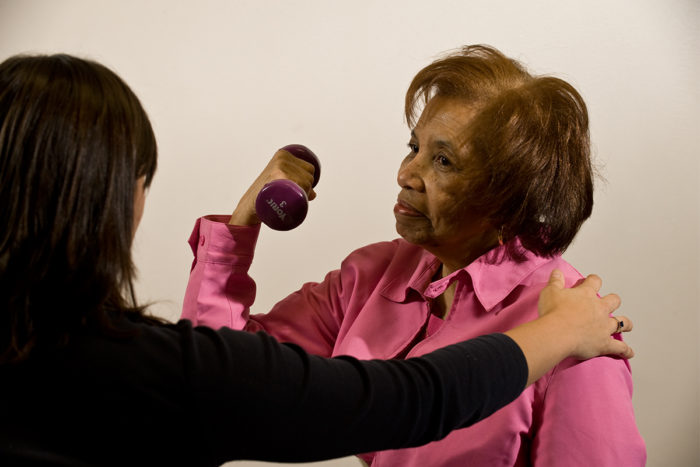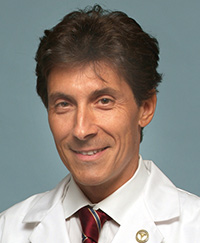Collaborative care benefits stroke patients
Washington University, Barnes-Jewish Hospital and The Rehabilitation Institute have formed the Brain Recovery Core to improve stroke rehabilitation

Stroke patient, Beatrice Parks, working with a physical therapist at The Rehabilitation Institute of St. Louis.
The road to recovery after stroke is a long one that often includes not only initial assessment and treatment in hospitals but also significant time in inpatient and outpatient rehabilitation services. Throughout this process, patients see a wide range of specialists, including acute care physicians, radiologists, neurologists, neurosurgeons and physical and occupational therapists.
To improve care and advance the development of new treatments, Washington University, Barnes-Jewish Hospital and The Rehabilitation Institute of St. Louis have established a collaborative group to ensure that all the specialists who treat stroke patients at these three institutions communicate and share data effectively. The group is known as the Brain Recovery Core (BRC).
Assessing treatments and recovery times

“The BRC’s goal is to standardize, collect and share data throughout the entire course of stroke treatment,” says Maurizio Corbetta, MD, the Norman J. Stupp Professor of Neurology at Washington University School of Medicine and clinical director of The Rehabilitation Institute of St. Louis’ Stroke and Brain Injury Program. ”We’re doing this both to help us predict how challenging recovery will be for the patients and also to assess the effectiveness of our treatments in facilitating recovery.”
With a grant from the Barnes-Jewish Hospital Foundation, Corbetta and his colleagues, including Washington University physical therapist Catherine Lang, PhD, and Washington University neurologist Jin-Moo Lee, MD, PhD, attending physician of the acute stroke service at Barnes-Jewish Hospital, are starting their evaluation of treatments at the very beginning. They are assessing the long-term recovery of patients treated with tPA, a clot-busting drug that can only be given within the first few hours after stroke. These results will be compared to those of stroke patients who could have been treated with tPA but did not arrive at the hospital quickly enough.
In the area of prognosis, Marghuretta Bland, DPT, coordinator for the BRC, and her colleagues published a study showing that testing a patient’s balance and ability to walk soon after a stroke gave a good indication of how well the patient would be able to walk a few weeks later at home.
“When we used to have patients in inpatient rehabilitation for months at a time, it was easy for the doctors to help families to identify and implement the changes that the patient’s house might need—like railing on the stairs or changes to the doorways,” says Lang. “Now, though, we’ve got at most two or three weeks, so everything needs to happen very quickly. These sorts of indicators help us better prepare the patient and the family for discharge right from the beginning.”
Patients who received acute care for a stroke at another hospital may still come to the Brain Recovery Core for rehabilitation, Corbetta notes. Doctors may call 314-362-4503 to refer a patient to the neurorehabilitation clinic at Barnes-Jewish Hospital, where the patient will be entered into the BRC.







